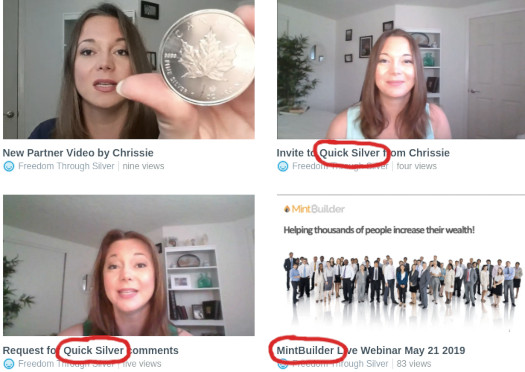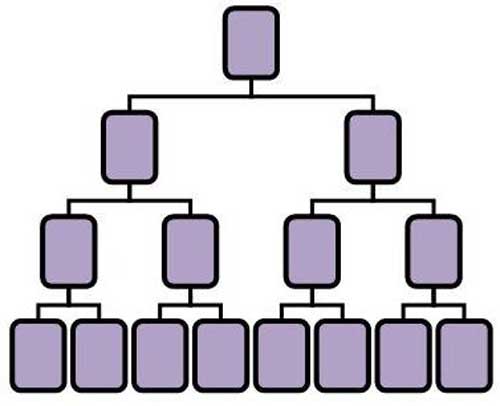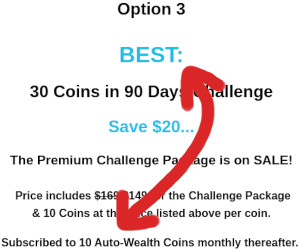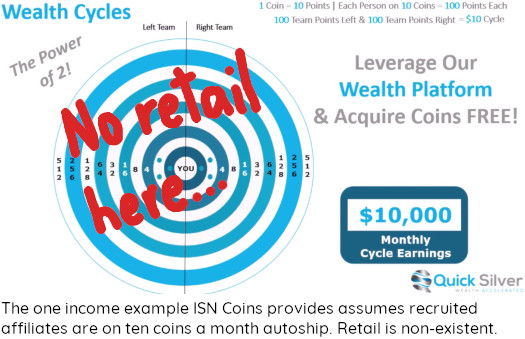QuickSilver Review: ISN Coins’ second spinoff
 A visit to the QuickSilver website reveals no information on who’s behind the company.
A visit to the QuickSilver website reveals no information on who’s behind the company.
Quicksilver’s website domain (“quicksilver.me”) was registered in December 2018.
Quick Silver Global LLC is listed as the owner, through a UPS store address in Florida.
My own research lead me to affiliates marketing QuickSilver in conjunction with Mint Builder.

 Mint Builder is a 2017 bitcoin spinoff of ISN Coins, launched by founder and CEO Matt Barkes (right).
Mint Builder is a 2017 bitcoin spinoff of ISN Coins, launched by founder and CEO Matt Barkes (right).
I was able to confirm QuickSilver is a second ISN Coins spinoff by visiting their website.
On their website, ISN Coins markets QuickSilver as a “new way to acquire assets!”
Social media marketing reveals QuickSilver went into prelaunch back in May.
Both ISN Coins and Mint Builder appear to be dead. Their respective company websites have Alexa traffic rankings of 3.3 million and 4 million respectively.
QuickSilver appears to be a third attempt to resuscitate the company.
Read on for a full review of QuickSilver’s MLM opportunity.
QuickSilver’s Products
QuickSilver affiliates have access to an online storefront, through which they can sell supplied coins to retail customers.
QuickSilver’s Compensation Plan
QuickSilver affiliates sign up and agree to one of three offered autoship options.
- Option 1 – two coins a month on autoship for $42.30
- Option 2 – a Premium Challenge Package plus four coins a month on autoship for $233.60
- Option 3 – a Premium Challenge Package plus ten coins a month a on autoship for $360.50
Note that for autoship cost calculation, QuickSilver affiliates are charged $21.15 per coin on autoship.
In order to qualify for MLM commissions, each QuickSilver affiliate must buy or sell at least one coin a month.
QuickSilver’s compensation plan pays affiliates both on retail customers and recruited affiliates on autoship.
QuickSilver ties retail autoship and recruitment autoship commission rates to “personal points”.
For each Premium Challenge Pack retail customer purchase or affiliate recruited, the referring affiliate generates 40 points.
For each coin a Quicksilver affiliate themselves purchases, they generate 10 points.
- if a QuickSilver affiliate generates 40 points a month, they receive $20 per Premium Challenge Package sold to retail customers or purchased by a recruited affiliate
- if a QuickSilver affiliate generates 100 personal points a month, they receive $50 per Premium Challenge Pack sold to retail customers or purchased by a recruited affiliate
Note that the Premium Challenge Package is only available in affiliate autoship options 2 and 3.
Residual Premium Challenge Pack Commissions
To qualify for residual Premium Challenge Pack commissions, a QuickSilver affiliate must sell two Premium Challenge Packs to affiliates and/or personally recruited affiliates within their first 90 days.
Once qualified, QuickSilver affiliates
- with 40 personal points a month earn $10 for each Premium Challenge Pack their personally recruited affiliates sell to retail customers or recruited affiliates
- with 100 personal points a month earn $20 for each Premium Challenge Pack their personally recruited affiliates sell to retail customers or recruited affiliates
Note that it is unclear if a QuickSilver affiliate can still qualify for residual commissions if they miss their first 90 day qualification deadline.
Residual Commissions
QuickSilver pays residual commissions via a binary compensation structure.
A binary compensation structure places an affiliate at the top of a binary team, split into two sides (left and right):

The first level of the binary team houses two positions. The second level of the binary team is generated by splitting these first two positions into another two positions each (4 positions).
Subsequent levels of the binary team are generated as required, with each new level housing twice as many positions as the previous level.
Positions in the binary team are filled via direct and indirect recruitment of affiliates. Note there is no limit to how deep a binary team can grow.
Residual commissions are tied to points. As with residual recruitment commissions, QuickSilver affiliates generate 10 points per coin they purchase or sell each month.
For every 100 points matched on both sides of the binary team, QuickSilver affiliates are paid a $10 residual commission.
Joining QuickSilver
QuickSilver affiliate membership is $20 and then $9.97 a month.
QuickSilver’s affiliate signup page requires selection of one of three autoship options:
- Option 1 – $42.30 a month
- Option 2 – $233.60 and then $84.60 a month
- Option 3 – $360.50 and then $211.50 a month
Conclusion
 QuickSilver is the continuation of ISN Coin’s pyramid scheme business models.
QuickSilver is the continuation of ISN Coin’s pyramid scheme business models.
Our first ISN Coins review was published was back in 2012. Even back then, ISN Coins was nothing more than an affiliate autoship recruitment scheme.
ISN Coins’ first collapse hit in 2014, prompting a new but still affiliate autoship recruitment focused reboot.
That lasted a few years but also eventually collapsed. In late 2017 Mint Builder was launched, which two years later has also collapsed.
Technically both ISN Coins and Mint Builder are still active, but both businesses are dead in the water.
That brings us to QuickSilver… which is more of the same.

Simply put; If there was any retail interest in ISN Coins’ monthly coin autoship, the company wouldn’t be going through its third reboot.
Time and time again ISN Coins has demonstrated that outside of the business opportunity, there is little to no purchase activity.
This means like ISN Coin’s other reboots, once QuickSilver affiliate recruitment dies off, it too will collapse.
There appears to be a fundamental problem with ISN Coin’s product offering.
Until they address the retail viability of silver coins that apparently nobody is interested in, changing company names and compensation plans will lead nowhere.


FYI I am not an owner of or affiliated with QuickSilver.me.
Hi Matt, I’m not doubting that but can you explain why are/were the two opportunities marketed interchangeably?
Hi Matt, once you used the term “pyramid scheme” you lost any analytical credibility.
As you and anyone on remotely informed on the industry, pyramid schemes are illegal and would not pass the Secretary of State to be allowed to operate.
If you hate the industry or company, choose more accurate adjectives…or you do this to invoke fear in potential and current affiliates. Thank you!
In my ten years of covering the MLM industry I’ve never seen a Secretary of State take action against an MLM pyramid scheme.
Claiming they vet the business model each and every MLM company ever launched is absolute bullshit.
When you pretend to know what you’re talking about but don’t, this is what happens.
And Oz is NOT Matt.
Bark up the right tree please.
How then do you explain this: opencorporates.com/companies/us_fl/L19000023443
You are clearly listed as an agent and director/officer of Quick Silver Global LLC on OpenCorporates Website. You are definitely affiliated.
I too have wondered why you refer to MLMs as pyramid schemes. (Ozedit: snip, derails removed see below.)
I don’t. I refer to pyramid schemes as pyramid schemes.
Read the review if you’re unclear on why QuickSilver is a pyramid scheme.
Why did you edit my comment? Were the questions too difficult to answer?
I read the review, and the only conclusions I can come to on why you might think Quick Silver, along with virtually every other MLM you review on your website, is referred to as pyramid scheme, is the element of recruitment and a lack of retail interest.
Where government bureaucrats obtain their power to force private companies to sell a specific number of products to a specific number of people at a specific price is beyond me, but that’s an entirely different conversation.
Even so, I still fail to see how lack of interest at a retail level is equivalent to that of a pyramid scheme.
Because the rest of your comment was based on a flawed premise, which I addressed.
I didn’t ask you to come up with conclusions, I told you to read the review if you don’t understand why QuickSilver is a pyramid scheme.
Here’s some reading material for you:
https://behindmlm.com/companies/latest-ftc-guidance-to-mlm-industry-emphasizes-retail-sales/
https://behindmlm.com/mlm/ftc-mlm-companies-with-little-to-no-retail-activity-are-illegal/
I couldn’t give a shit about your whacky government conspiracy theories. Keep them to yourself.
Don’t get mad, just put more thought into your arguments and you will have more credibility when you make them.
Years ago I worked with a top money earner is a major MLM. Every year he would get an email from corporate stating that he had failed to meet his quota of the mandated retail sales requirements that every MLM must meet to stay in compliance. I saw these emails with my own two eyes.
You know what he would do each and every year to meet those requirements? He created a retail account for his next door neighbor whom he had become friendly with, and he created retail accounts for several members of his immediate family, and he would then purchase thousands of dollars of retail products through those accounts with his own credit card, thus fulfilling the retail sales mandate.
He would then keep those products for personal consumption, give them away as samples, or sell them to his existing downline. So in your eyes, and in the eyes of the law, he and his company are operating a perfectly legal MLM, and one that you would consider to not be a pyramid scheme.
Furthermore, I never made claim to government conspiracy theories. I simply asked where government (Ozedit: derail removed)
He committed fraud.
Nope. Still a pyramid scheme.
With respect to the law, and FTC investigation would reveal his fraud and result in the sales being classified as an affiliate purchase.
If this was company-wide at the expense of retail, the FTC would classify that MLM company as a pyramid scheme.
Look if you’ve got anything further specific to QuickSilver then have at it. I’ve explained why it’s a pyramid scheme and your anecdotal story about fraud doesn’t change that.
If you want to rage against the government do it somewhere else.
Possibly, but the anecdotal story shows the absurdity of the law. And again….”rage against the government”, “whacky government conspiracy theories”…..I’m not sure why you’re interpreting my comments as such. Perhaps it’s your anger.
As far a Quick Silver: I’m a retail customer that receives two coins each month. I have not participated in the business model at all, nor do I want to. My sole involvement is that of a customer. Please explain how I’m participating in a pyramid scheme.
No it doesn’t. MLM + little to no retail = pyramid scheme.
The only thing your anecdotal story goes is the lengths scammers will go to in a pyramid scheme.
Retail isn’t viable in QuickSilver. If it was the company wouldn’t be on its third reboot.
Regardless, you as an individual doesn’t change QuickSilver recruitment orientated business model.
And please. You’re a retail customer on here lecturing me on the industry? Cuz y’know, that’s typical retail customer behavior.
Sure thing chief.
Maybe I’m missing something here, but committing fraud and being labeled a scammer typically implies there are victims involved in the fraud and in the scam? Who might that be in this scenario?
On the Quick Silver website, it gives you the option to join as a “Wealth Ambassador” or “Preferred Customer.”
I was asked to join Quick Silver because I had an account with Mintbuilder. After learning I would have to pay a $10 monthly affiliate fee to maintain the business, I cancelled my account.
After receiving a promotional email from Quick Silver, I responded letting them know I would be interested if they would discontinue the $10 monthly fee. I was then informed that I could be a customer and not have to pay the $10 fee. So, I am now a customer, in every sense of the word.
Other than purchasing the coins themselves, I pay no fees to maintain an affiliate business. So again, I ask…. how am I participating in a pyramid scheme?
Same as any other pyramid, the recruits at the bottom.
So are you or are you not an affiliate?
Affiliate purchases != retail sales.
MLM + little to no retail sales = pyramid scheme.
If ISN Coins was retail viable, it wouldn’t be on its third reboot.
So by purchasing retail products with his own money, this guy is victimizing the recruits at the bottom? Is he victimizing the recruits in his own downline, or the recruits throughout the entire company as well? How so?
I disagree.
Not true. The problem with INS wasn’t retail viability, it was the cost of the products in general. They sold their autoship coins for right around $100 for affiliates. I could buy that same coin down the street for $35 to $40. That is what was not viable.
Considering silver is silver throughout the known world, and no one sells better silver than someone else, you must compete on price, rather than quality, to sell your silver. ISN could not compete on price and offer the type of compensation MLMs typically offer.
If he’s committing fraud to meet retail quotas then retail obviously isn’t viable and he’s in a pyramid scheme.
Typically people self-fund commission qualification to qualify for commissions on those below them doing the same.
Those at the bottom of the pyramid lose money and are victims – whether they choose to acknowledge it or not.
I think your anecdote has run its course, I’ll be marking anything further on it as spam.
Cool. Don’t care whether you disagree that pyramid scheme are pyramid schemes. Take it up with the FTC.
So in other words, ISN Coin’s products were priced such that only those participating in the pyramid scheme would purchase them. I.e. the business wasn’t retail viable.
QED. I think we’re done here.
Sometimes, although not typically. Even so, if a downline affiliate agrees to participate in that (and participation would be necessary), then I fail to see a victim of a scam or fraud.
So those who do not consider themselves to be victims are in fact victims, according to you? Man, there’s a lot to unpack there. It would be a waste of time to unpack it, unfortunately.
Partially true. They were priced in such a way that even the affiliates would no longer purchase them. I.e. the business wasn’t viable solely because of exorbitant pricing.
Not surprised.
There’s no other reason to self-qualify for commissions.
A big part of the fraudulent nature of a pyramid scheme is stringing victims along on the promise of eventual riches.
Math guarantees the majority of participants in a pyramid scheme lose money. Thankfully, in the interests of bringing scammers who do a number on their victims to justice, how victims feel at the time isn’t a consideration.
Right, unless they were going to earn commissions from recruited victims who were also buying overpriced garbage.
Congratulations, you’ve arrived at the definition of a product-based pyramid scheme.
I am in no way shape or form interested in recruiting or selling anything.
My question is this. As a customer would I be paying more for the silver coins than I would going to a local coin store?
Seeing as only you know where “local” is, maybe you should go down the local coin store to check?
All I Want To Know, Is The Silver Real ?
BTW: If I simply PURCHASE on monthly autoship and don’t recruit, isn’t that “retail”…..
If you’re an affiliate on autoship, regardless of whether you recruit or not you’re not a retail customer.
If you want to be a retail customer don’t sign up as an affiliate.
I’ve found QuickSilver to be great. Even if you don’t sign anyone up, you still get a coin at a great price delivered to your door each month.
You can also do drop-shipping (so order on your own account for a retail customer, use your billing details and their address).
The low-start up costs (you can become a preferred customer and just pay for the coin plus delivery) make silver really affordable to most people.
It may not be perfect, but I find it’s far better than the other MLMs out there that sell products people don’t really want.
So you get a coin at a great price, right? How do you know it is at a great price? Have you done any comparison shopping on silver coins?
You see I know you haven’t because if you had you would have found out you could get the same coin at a lower cost than they are advertising the cost of the coin.
One thing that was truly interesting is that Quicksilver never mentions the grading of the coin or its condition.
All reputable coin dealers not only show the condition of the coin, but they also provide the grading number of the coin. Both of these set the price of the coin.
It makes a big difference if it is a brilliant uncirculated coin versus a brilliant coin, or uncirculated coin. It makes a difference if it is graded MS62, MS63, etc. to the highest grade of MS70.
Rather odd for such a great company to omit this information on their website don’t you think? Unless of course they are pawning off lower grade coins as quality grade coins.
In reviewing the website, interesting that Quicksilver is not a member of the BBB, Business Consumer Alliance, Numismatic Guaranty Corporation, or The National Coin & Bullion Association. You know like reputable coin dealers are members.
Rule of thumb, if a coin company does not provide you the condition or the grade of the coin you are buying before you buy it…RUN!
When you add in the MLM income generator program, you became an investment and are subject to all the securities laws in every country in which you do business.
Since Quicksilver is not registered with the SEC, it is operating illegally.
But please let us know what grade and quality of coins you are receiving since they are such a great price. Thanks.
Hi,
The grading and condition of the coins are made clear in the shop.
Most are GEM BU, so in the same condition as when they left the mint.
The MS69 or MS70 coins are all NGC verified, and if you email support, they’d be able to provide you with the grading number so you could verify on the NGC website.
I have never received any counterfeit products from QuickSilver or had any issues with them. Their support team are always helpful and resolve any issues promptly.
Pricing is also made clear. For example, there is no minimum order or credit card surcharge, unlike some other companies.
I regularly compare prices of the coins and take into account shipping, taxes, credit card fees etc. As a result, I usually find that QuickSilver has the best all-in price, even if the initial listed price is a little higher.
Even if I did find a coin slightly cheaper elsewhere, I’d probably still buy from QuickSilver as I’ve never had any issues with them before.
I hope that answers all your questions.
Thank you for your reply. Here’s the problem: You can’t access the shop unless you are signed up/registered with them.
They need to show all this information on their website for all to see before having to register or sign up with them. That’s not how real coin dealers operate.
They are not registered with any of the organizations that I referenced, which is a red flag.
Coin dealers register with them as it gives them credibility and confidence to the buyer they are legitimate. They can’t register with them since they are operating illegally.
The only real question is: How long before they do a runner, or get shut down by the authorities?
And the ~33% commissions paid on the coins (a $21.30 coin potentially generates $5 in commission to the seller and $2 to the person that recruited them) come from where, magic?
If what you were saying was true then
a) Quicksilver wouldn’t have next to no retail activity;
b) its owners could just sell the coins themselves and keep the extra 33% profit margin they have generated by magic.
Hi,
The details are available on the shop.
You can go to (Ozedit: referral link removed) and see all the coins listed, and their details. Support can also answer any questions that you may have.
As for them “doing a runner”, I’ve been with them since 2019 and always found they value their customers and provide a good service.
Maybe others had different experiences but I can only speak for myself.
No ref links. If a link to the shop is provided it should be a default URL.
You need the referer’s ID so that they get credit. After all, it was they who referred you to the store, why shouldn’t they receive a commission if you make a purchase? It doesn’t affect your pricing.
I’m not going to engage in this discussion further. You’ve obviously already decided that QuickSilver isn’t for you (which is fine, you’re entitled to your opinion) and there are plenty of other dealers out there.
I don’t have a problem with referral links, just not on here.
Any MLM company that’s retail focused has no problem providing retail pricing on their website.
MLM companies that fail to provide consumers with crucial information, such as retail pricing, may be in violation of the FTC Act (disclosures).
Your dismissing of the above facts as “opinion” and dummy spit are telling. Reader beware.
Thanks for the info! I’m not even going to give them my credit card info for the freebie silver gram.
Who knows, I could “accidentally get signed up for a membership“.